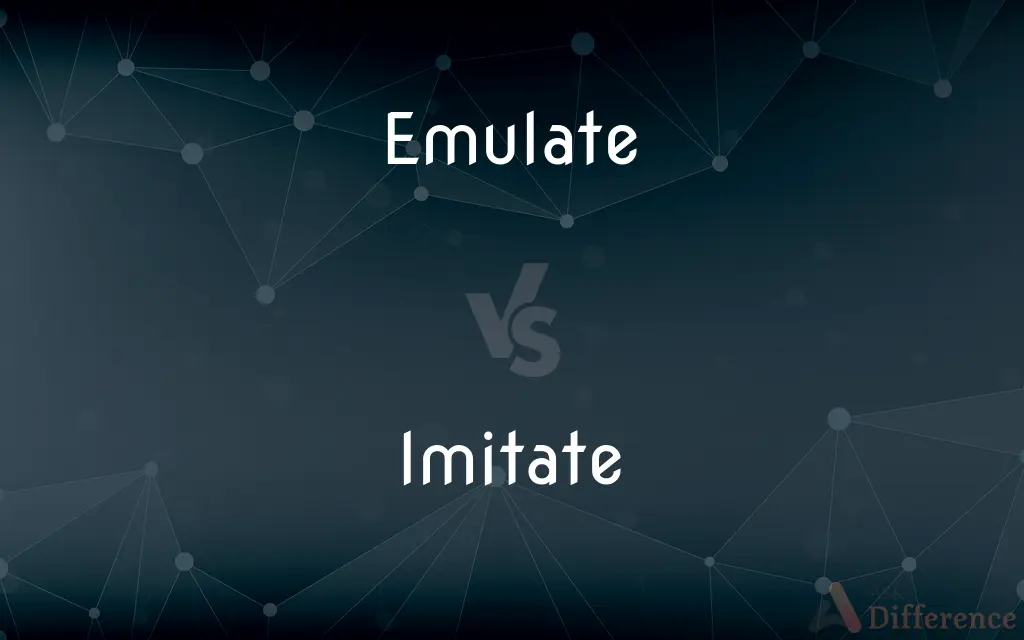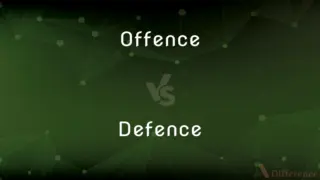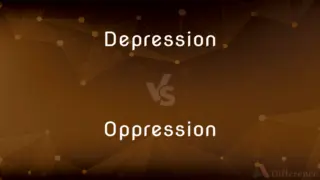Emulate vs. Imitate — What's the Difference?
By Urooj Arif & Maham Liaqat — Updated on April 16, 2024
Emulate involves matching or surpassing a model through imitation with improvement, focusing on achievement; imitate means directly copying someone's behavior or actions without the intent of improvement.

Difference Between Emulate and Imitate
Table of Contents
ADVERTISEMENT
Key Differences
Emulate is often driven by admiration and involves efforts to equal or exceed the qualities or achievements of the model. On the other hand, imitate refers simply to the act of copying or mimicking behaviors, actions, or techniques without necessarily aiming to surpass the original.
While emulation includes an element of competition or aspiration, aiming to reach or surpass a standard set by someone else, imitation does not inherently include this ambition, focusing more on replication for various reasons such as learning or entertainment.
Emulation can be seen in contexts like technology or academics, where innovations aim to not only replicate but also enhance previous standards. Conversely, imitation is more prevalent in areas like art or entertainment, where reproducing styles or methods accurately is often the goal.
Emulators often seek to understand the underlying principles or techniques behind what they are emulating in order to innovate or improve upon them. Whereas imitators might focus more on the surface level, achieving a visual or behavioral likeness without delving into deeper mechanics.
In emulation, the outcome is frequently a new standard or improved version of the original, which may lead to progress in a field. Imitation, however, often aims to preserve the original state or understanding of the work, maintaining a consistent form without alteration.
ADVERTISEMENT
Comparison Chart
Definition
Striving to match or surpass someone or something
Directly copying someone’s behavior or actions
Intent
Improvement and competition
Replication without enhancement
Common Contexts
Technology, business, academics
Arts, learning, entertainment
Focus
Underlying principles and innovation
Surface level attributes
Outcome
Often leads to advancements and new standards
Maintains or recreates existing standards
Compare with Definitions
Emulate
Strive to equal or surpass.
She hopes to emulate her brother’s academic achievements.
Imitate
Copy someone’s actions or methods.
The child imitates his favorite superhero’s gestures.
Emulate
Imitate with effort to exceed.
Startups often try to emulate the success of industry leaders.
Imitate
Mimic behaviors or sounds.
Parrots are known for imitating human speech.
Emulate
Reflect a role model's attributes.
He emulates his teacher’s critical thinking skills.
Imitate
Replicate for learning or entertainment.
Actors often imitate historical figures in films.
Emulate
Adopt an ambitious standard.
Many authors emulate Hemingway’s concise writing style.
Imitate
Reproduce a style or appearance.
The artist imitates the Renaissance style in her paintings.
Emulate
Mimic in an aspiring manner.
Young athletes emulate professional players in their training routines.
Imitate
Follow an example without modification.
He imitates his mentor’s approach to research.
Emulate
Emulate, Inc. (Emulate) is a startup company that is commercializing Organs-on-Chips technology—a human cell-based technology that recreates organ-level function to model organs in healthy and diseased states.
Imitate
To use or follow as a model
Your brother imitates you because he admires you.
Emulate
To strive to equal or excel, especially through imitation
An older pupil whose accomplishments and style I emulated.
Imitate
To copy the mannerisms or speech of; mimic
Amused her friends by imitating the teachers.
Emulate
To compete with successfully; approach or attain equality with.
Imitate
To copy (mannerisms or speech)
Can you imitate his accent?.
Emulate
(Computers) To imitate the function of (another system), as by modifications to hardware or software that allow the imitating system to accept the same data, execute the same programs, and achieve the same results as the imitated system.
Imitate
To copy exactly; reproduce
"drugs that can imitate the hormone's positive effects while reducing its adverse effects" (The Scientist).
Emulate
To attempt to equal or be the same as.
Imitate
To appear like; resemble
A fishing lure that imitates a minnow.
Emulate
To copy or imitate, especially a person.
People are endlessly fascinating, even if you'd never want to emulate them.
Imitate
To follow as a model or a pattern; to make a copy, counterpart or semblance of.
Emulate
(obsolete) To feel a rivalry with; to be jealous of, to envy.
Imitate
To follow as a pattern, model, or example; to copy or strive to copy, in acts, manners etc.
Despise wealth and imitate a dog.
Emulate
(computing) of a program or device: to imitate another program or device
Imitate
To produce a semblance or likeness of, in form, character, color, qualities, conduct, manners, and the like; to counterfeit; to copy.
A place picked out by choice of best aliveThe Nature's work by art can imitate.
This hand appeared a shining sword to weild,And that sustained an imitated shield.
Emulate
(obsolete) Striving to excel; ambitious; emulous.
Imitate
To resemble (another species of animal, or a plant, or inanimate object) in form, color, ornamentation, or instinctive habits, so as to derive an advantage thereby; sa, when a harmless snake imitates a venomous one in color and manner, or when an odorless insect imitates, in color, one having secretion offensive to birds.
Emulate
Striving to excel; ambitious; emulous.
Imitate
Reproduce someone's behavior or looks;
The mime imitated the passers-by
Children often copy their parents or older siblings
Emulate
To strive to equal or to excel in qualities or actions; to imitate, with a view to equal or to outdo, to vie with; to rival; as, to emulate the good and the great.
Thine eye would emulate the diamond.
Imitate
Appear like, as in behavior or appearance;
Life imitate art
Emulate
Strive to equal or match, especially by imitating;
He is emulating the skating skills of his older sister
Imitate
Make a reproduction or copy of
Emulate
Imitate the function of (another system), as by modifying the hardware or the software
Emulate
Compete with successfully; approach or reach equality with;
This artists's drawings cannot emulate his water colors
Common Curiosities
Can emulation be seen as a form of flattery?
Yes, emulation can be seen as flattery because it involves admiration and the desire to reach or exceed someone’s standards.
What role does imitation play in early childhood development?
Imitation plays a crucial role in early childhood development, as children learn basic skills and social behaviors by copying adults and peers.
What does it mean to emulate someone?
To emulate someone means to strive to match or surpass them, often through imitation coupled with an effort to improve.
How is imitate different from emulate?
Imitate involves straightforward copying without the aim to surpass, whereas emulate includes a component of competition or improvement.
Can emulation lead to innovation?
Yes, emulation can lead to innovation as it often involves analyzing and building upon the existing methods to create something better or more efficient.
How do businesses use emulation strategically?
Businesses often emulate successful market leaders or innovations, adapting their strategies to compete more effectively while also seeking to surpass the original models.
Why do people imitate others?
People imitate others for various reasons, including learning, entertainment, or admiration, often without the intent to improve upon the original.
Is emulation always positive?
While emulation is generally positive as it drives improvement and excellence, it can sometimes lead to excessive competition or unrealistic expectations if not balanced with personal creativity.
What is the difference between emulation and inspiration?
Emulation involves actively striving to match or exceed someone’s achievements, often through imitation, whereas inspiration might spark new, original ideas without direct copying.
How do imitation and emulation differ in their impact on creativity?
Emulation can enhance creativity by challenging individuals to improve upon existing ideas, while excessive imitation might limit creative thinking by focusing only on replication.
How can teachers use emulation as a tool in education?
Teachers can encourage emulation by setting high benchmarks and inspiring students to not only meet these standards but also to innovate and think critically about how they can improve upon them.
What are the psychological effects of excessive imitation?
Excessive imitation might hinder personal identity development and creativity, as it can cause individuals to rely too heavily on external models rather than developing their own ideas.
What are common areas where imitation is preferred over emulation?
In artistic performances like acting or in historical reenactments, imitation is preferred to maintain authenticity and respect for the original style or event.
Is there a place for imitation in professional training?
Yes, in professional training, imitation is crucial for learning specific skills or procedures before trainees are capable of innovating or adapting them to new contexts.
Share Your Discovery

Previous Comparison
Offence vs. Defence
Next Comparison
Depression vs. OppressionAuthor Spotlight
Written by
Urooj ArifUrooj is a skilled content writer at Ask Difference, known for her exceptional ability to simplify complex topics into engaging and informative content. With a passion for research and a flair for clear, concise writing, she consistently delivers articles that resonate with our diverse audience.
Co-written by
Maham Liaqat















































